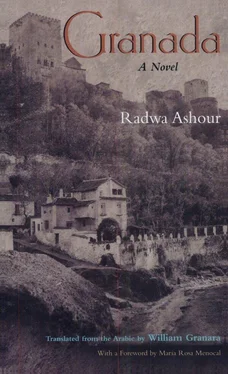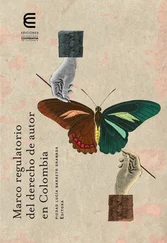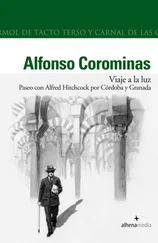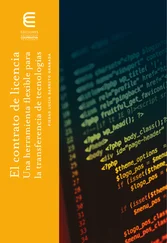Radwa Ashour - Granada
Здесь есть возможность читать онлайн «Radwa Ashour - Granada» весь текст электронной книги совершенно бесплатно (целиком полную версию без сокращений). В некоторых случаях можно слушать аудио, скачать через торрент в формате fb2 и присутствует краткое содержание. Год выпуска: 2003, ISBN: 2003, Издательство: Syracuse University Press, Жанр: Современная проза, Историческая проза, на английском языке. Описание произведения, (предисловие) а так же отзывы посетителей доступны на портале библиотеки ЛибКат.
- Название:Granada
- Автор:
- Издательство:Syracuse University Press
- Жанр:
- Год:2003
- ISBN:9780815607656
- Рейтинг книги:5 / 5. Голосов: 1
-
Избранное:Добавить в избранное
- Отзывы:
-
Ваша оценка:
- 100
- 1
- 2
- 3
- 4
- 5
Granada: краткое содержание, описание и аннотация
Предлагаем к чтению аннотацию, описание, краткое содержание или предисловие (зависит от того, что написал сам автор книги «Granada»). Если вы не нашли необходимую информацию о книге — напишите в комментариях, мы постараемся отыскать её.
Granada — читать онлайн бесплатно полную книгу (весь текст) целиком
Ниже представлен текст книги, разбитый по страницам. Система сохранения места последней прочитанной страницы, позволяет с удобством читать онлайн бесплатно книгу «Granada», без необходимости каждый раз заново искать на чём Вы остановились. Поставьте закладку, и сможете в любой момент перейти на страницу, на которой закончили чтение.
Интервал:
Закладка:

Granada
A Novel
by
Radwa Ashour
Other titles in Middle East Literature in Translation
The Author and His Doubles: Essays on Classical Arabic Culture
Abdeltattah Kilito; Michael Cooperson, trans.
The Committee
Sonallah Ibrahim; Mary St. Germain and Charlene Constable, trans.
A Cup of Sin: Selected Poems
Simin Behbahani; Farzaneh Milani and Kaveh Safa, trans.
Fatma: A Novel of Arabia
Raja Alem with Tom McDonough
Fugitive Light: A Novel
Mohammed Berrada; IssaJ. Boullata, trans.
In Search ofWalid Masoud: A Novel
Jabra Ibrahim Jabra; Roger Allen and Adnan Haydar, trans.
Moroccan Folktales
Jilali El Koudia, trans.; Roger Allen, ed.
Three Tales of Love and Death
Out El Kouloub
Women Without Men: A Novella
Shahrnush Parsipur; Kamran Talattof and Jocelyn Sharlet, trans.
Yasar Kemal on His Life and Art
Eugene Lyons Hebert and Barry Tharaud, trans.
Zanouba: A Novel
Out El Kouloub; Nayra Atiya, trans.
Foreword
Ways of Remembering Granada
In Arabic letters, the tradition of remembering the lost shards of Islamic Spain is an old and venerable one. The destruction of Cordoba itself — the Caliphate politically dismembered and the venerable city sacked, along with the nearby palatine city of Madinat al-Zahra, One Thousand and One Nights -like in its architectural wonders — was the subject of what is perhaps the best-known work of Andalusian literature, Tauq al-Hamam (The neck-ring of the dove), by Ibn Hazm of Cordoba. Not unlike the extended family of characters so lovingly created by Radwa Ashour in this novel, Ibn Hazm was himself of a generation that lived through the transition from one universe to another, a personal witness to the unimaginable losses that followed the political debacles of his time. The Cordoban’s celebrated work about love, and about its ways of shaping the human condition, and about the sorrows of loss in love, easily elides the love of a woman with that of his homeland. When he says “My love for her blotted out all that went before, and made anathema to me all that came after” he might as easily be describing one as the other. And it is precisely this kind of crucial interdependence of public and personal histories, and the ways in which life and love must indeed go on, and yet are unbearably transfigured by earthshaking historical events, that is on vivid display in Granada.
A work of historical fiction set in the aftermath of the Castilian takeover of the lone Islamic kingdom of Granada in 1492, Granada tells the story of an extended family grappling with the consequences of that political catastrophe for the Muslim community. Granada at that moment recreated here by the Egyptian novelist Radwa Ashour, the turn of the sixteenth century in a Spain where the New World has just barely been discovered, is removed by about five hundred years from Ibn Hazm’s devastated Cordoba — almost exactly as long and far as it is removed from us, and from the “interesting times” in which we ourselves live. One is tempted to argue that while the details of history change — and the textures and colors of everyday life are more or less exotic to a reader — the personal remains the same, and that the love stories and the family sagas that come to us superimposed on the narrative of the sack of Madinat al-Zahra by fundamentalist Berbers in 1009 are, at the end of the day, love stories and family sagas like all others, whether five or fifty or five hundred years later.
But in fact all history is not created equal, and the Arabs and many other Muslims have long harbored a complex nostalgia for an al-Andalus remembered, iconically, as both the best of times and the worst of times in their history. From Ibn Hazm through Radwa Ashour — with everyone from Ibn al-Khatib to Salman Rushdie in between — to evoke any given chapter within the longue duree of Andalusian history, no matter how seemingly domestic or how formally poetic, is to call forth the complex specter of how much a culture can achieve, how fragile such achievement is, and most of all, how much it can lose. Ashour has chosen 1492, the most easily lamentable moment in this history, and by far the most often chosen as a setting for historical novels [1] In relatively recent years one notes two prominent and best-selling 1492 novels: Tariq Ali’s Shadows of the Pomegranate Tree, with a setting just outside the city of Granada but at the same moment Ashour has chosen, and Noah Gordon’s The Last Jew, whose eponymous hero is, instead, from Toledo, but who shares with the Muslim characters — as the Jews did indeed share historically, in Spain, with the Muslims — their struggles with the choices of adaptation and conversion versus resistance or exile. Far less common are historical novels set in earlier moments in the very rich landscape that is the seven-hundred-some year history that begins in the middle of the eighth century, although two recent ones, both involving the more positive story of the legendary religious tolerance and cultural admixtures of caliphal Cordoba, are worth noting: Journey to the End of the Millennium by A. B. Yehoshua and, in French, Le calendrier de Cordue, by Yves Ouahnon.
—it is, after all, one of those moments of history whose various dramas, like those of the French Revolution, seem to have already been written by a melodramatic novelist. Nevertheless, in Granada she tells a story that is fresh in many ways, and whose relevance to contemporary issues does not obtrusively call attention to itself. In telling the story of an extended family on this cusp of history she leaves no doubt about the unmitigated evils that follow the revocation of rights at first granted to Muslims under Christian rule, without, however, leaving us with characters who are little more than mouthpieces for righteous ideology.
On the contrary, part of the genuine pathos of the novel — and I strongly believe the historical as well as personal verisimilitude — lies in the many different paths taken by the different members of the family, and in the equal love the novelist has for these very different children of her imagination. From those who became members of the violent resistance in the Alpujarras (that mountainous region to the southeast of Granada where Muslim refugees waged a ferocious struggle for dozens of years, until they were finally, brutally, repressed) to those who were not only willing to convert to Christianity, but even loath to give shelter, in the family house, to other family members suspected by the Inquisition authorities, all of her characters are first and foremost complex human beings and not easily judged. Driven by different ways of expressing their love for each other, for their culture, and for their children, these men and women (and the women have center stage a great deal of the time, as the enduring centers of a social world that is increasingly hidden and domestic, and this too she shares with Ibn Hazm, whose love-treatise is set inside the harem where he was brought up) struggle to make the best decisions they can, when no decision seems quite good enough, under the circumstances. So the matter of heroes and villains is largely left open-ended and the only exception to this general human role is that of the handful of Castilian Christians who appear in the story, who are almost invariably the villainous and cartoonish heavies. But since this was in fact almost always officially and publicly the case, and since Ashour’s few Christians here are mostly public and not domestic figures, it is hard to quibble with such a representation, although the extent to which ordinary Christians may not have shared the totalitarian program of the Church is as vital to the genuine pathos of the history as the conversions to Christianity by so many Muslims.
Читать дальшеИнтервал:
Закладка:
Похожие книги на «Granada»
Представляем Вашему вниманию похожие книги на «Granada» списком для выбора. Мы отобрали схожую по названию и смыслу литературу в надежде предоставить читателям больше вариантов отыскать новые, интересные, ещё непрочитанные произведения.
Обсуждение, отзывы о книге «Granada» и просто собственные мнения читателей. Оставьте ваши комментарии, напишите, что Вы думаете о произведении, его смысле или главных героях. Укажите что конкретно понравилось, а что нет, и почему Вы так считаете.












